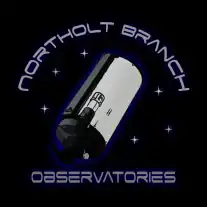Northolt Branch Observatories
The Northolt Branch Observatories (NBO; Observatory codes: Z80, Z48 and Z37) is an astronomical observatory located in London, England. NBO collects follow-up astrometry of near-Earth asteroids and other small Solar System objects.[1] It focuses on public outreach, sharing images, videos and information about asteroids on social media.
 Northolt Branch Observatories logo | |||||||||
| Alternative names | NBO | ||||||||
|---|---|---|---|---|---|---|---|---|---|
| Observatory code | Z80, Z48, Z37 | ||||||||
| Location | London, Greater London, London, England | ||||||||
| Coordinates | 51.55466°N 0.37192°W | ||||||||
| Altitude | 55 metres (180 ft) | ||||||||
| Established | September 27, 2015[1] | ||||||||
| Website | www | ||||||||
| Telescopes | |||||||||
| |||||||||
The two main belt asteroids 72834 Guywells and 128345 Danielbamberger are named after members of the Northolt Branch Observatories team.[2][3]
History
Northolt Branch Observatories was founded in 2015, as an extension of the London-based Northolt Branch Astro group of local amateur astrophotographers.[4] It is a British-German collaboration: Data is collected on-site by observers at the telescopes in England, and then processed remotely from Germany.[5]
Activities
Northolt Branch Observatories is an educational outreach partner with NEOShield-2.[6] It works closely with Asteroid Day[7][8] and the PACA (Pro-Am Collaborative Astronomy) Project, with the goal to raise awareness about asteroids.[9][1] In 2016 and 2017, NBO hosted the International Capture The Asteroid imaging contest, in partnership with NEOShield-2.[10][11] The annual competition is targeted particularly at amateur astrophotographers, who rarely choose to image asteroids in favour of planets or deep-sky objects.[12]
In addition to observing Near-Earth asteroids, NBO also provides supernova confirmation[13][14] and long-term follow up of comets as part of PACA observing campaigns. Examples of PACA campaigns with contributions from NBO include Rosetta's comet 67P/Churyumov–Gerasimenko,[15] and the comets 41P/Tuttle–Giacobini–Kresák and 45P/Honda–Mrkos–Pajdušáková.[16]
References
- "Our Story: The Northolt Branch Observatories". facebook.com. Retrieved March 1, 2018.
- "Sein Name fliegt durchs All: Asteroid nach Hobby-Astronom aus Laisa benannt" (in German). Hessische/Niedersächsische Allgemeine (HNA). April 22, 2018.
- "Ein "Stern", der seinen Namen trägt" (in German). Oberhessische Presse. April 15, 2018.
- "Astrophiz 23: Meet Asteroid Hunters Daniel Bamberger and Guy Wells. Astrophotographer Dr Ian 'Astroblog' Musgrave". December 15, 2016. Retrieved March 1, 2018.
- "Astrophiz 50: Asteroid Hunters II". February 1, 2018. Retrieved March 1, 2018.
- "Educational Outreach Partners". NEOShield-2. Retrieved March 1, 2018.
- Bamberger, Daniel (December 20, 2016). "Christmas Rocks". blog.asteroidday.org. Archived from the original on March 2, 2018. Retrieved March 1, 2018.
- Griffin, Rory (producer/director) (June 30, 2016). Man Vs. Asteroid: An Asteroid Day Special (Motion picture). Discovery Science. Archived from the original on March 2, 2018. Retrieved March 1, 2018.
- "PACA Solar System Outreach". facebook.com. Retrieved March 1, 2018.
- "NEOShield2's Capture the Asteroid competition results are in!". Squirrel Valley Observatory. December 6, 2016. Retrieved March 1, 2018.
- Dienel, Franziska. "Capture the Asteroid Competition 2017". neoshield.eu. Retrieved March 1, 2018.
- "How to capture an asteroid – first steps". facebook.com. Northolt Branch Observatories. September 22, 2017.
- "Observer BDAD (Daniel Bamberger)". aavso.org. American Association of Variable Star Observers. Retrieved March 1, 2018.
- Bishop, David. "Bright Supernova". rochesterastronomy.org. Retrieved March 1, 2018.
- Yanamandra-Fisher, Padma (June 13, 2014). "The role of amateur astronomers in Rosetta's mission". ESA. Retrieved March 1, 2018.
- King, Bob (November 30, 2016). "Comet Campaign Seeks Imagers Worldwide". Sky&Telescope. Retrieved March 1, 2018.
External links
- Northolt Branch Observatories on Facebook
- Astrophiz 23: Meet Asteroid Hunters Daniel Bamberger and Guy Wells
- Astrophiz 50: Asteroid Hunters II
- Comet Watch 2016/07/02: North Meets South, Astronomy.fm podcast
- Comet Watch 2017/07/15: With Guest Jeff Tobak of Northolt Astro
- Asteroid Orbit View, web application by David Rankin (in collaboration with NBO)
- NEODyS observation log
- Northolt Branch Astro
- The PACA Project